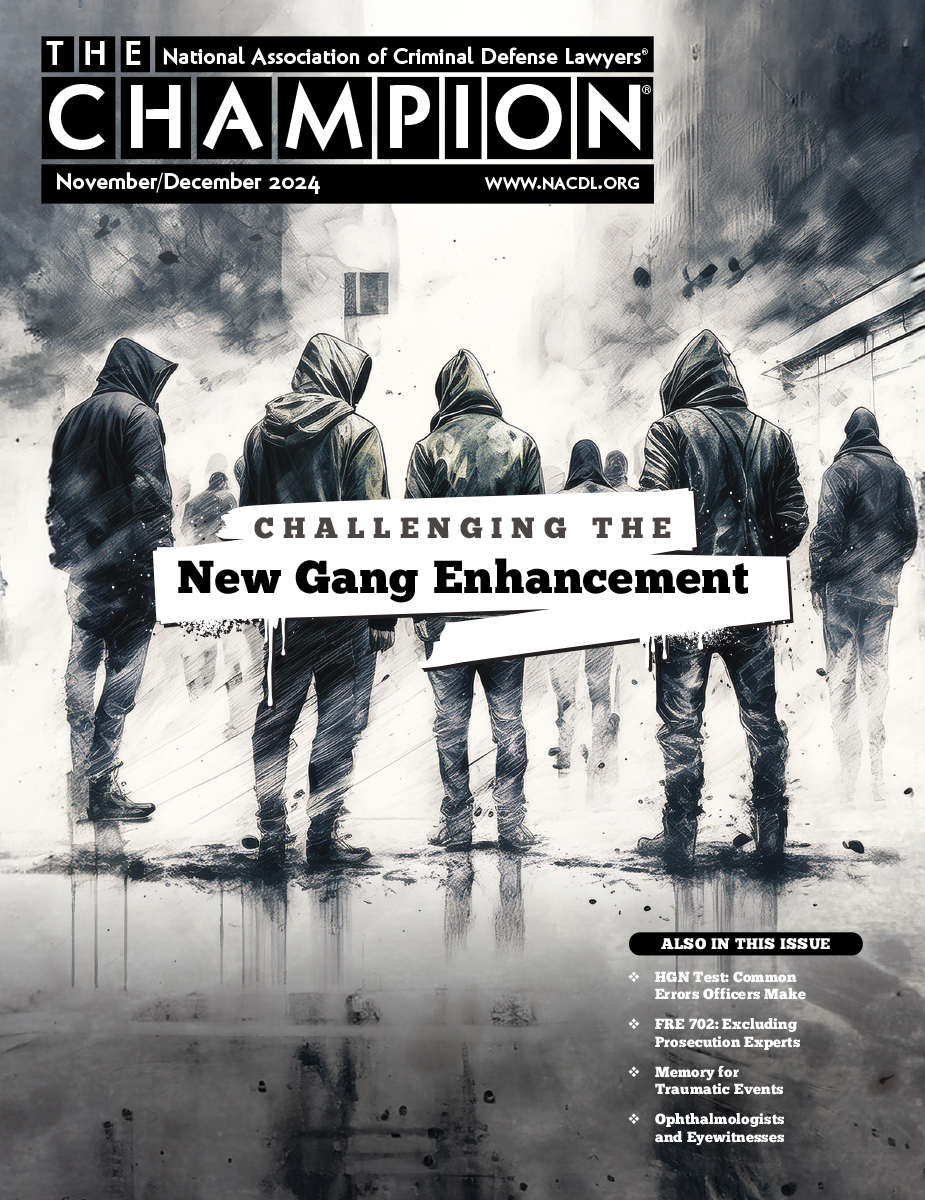November/December 2024

Does a crime victim’s memory for a traumatic event improve and become more complete in the days after the trauma? How can a defense attorney challenge the gang enhancement? Find the answers in this issue of The Champion.
Articles in this Issue
-
Affiliate News
What events are NACDL affiliates hosting this month? Find out here.
-
Book Review: Correction: Parole, Prison, and the Possibility of Change by Ben Austen
This month Amelie Gonzalez and Jacqueline Goodman review Correction: Parole, Prison, and the Possibility of Change by Ben Austen.
-
Book Review: When Crack Was King: A People’s History of a Misunderstood Era by Donovan X. Ramsey
This month Jon M. Sands reviews When Crack Was King: A People’s History of a Misunderstood Era by Donovan X. Ramsey.
-
Book Reviews: Exoneration After Unjustified Convictions
This month Teresa J. Sopp reviews Justice Pursued: The Exoneration of Nathan Myers and Clifford Williams by Bruce Horovitz and Dear Sister: A Memoir of Secrets, Survival and Unbreakable Bonds by Michelle Horton.
-
Common Errors in Administration of the Horizontal Gaze Nystagmus Test
Law enforcement officers employ the horizontal gaze nystagmus (HGN) test during DUI investigations. What are the correct procedures? What common errors do officers make when they administer the test?
-
Effectively Excluding Prosecution Experts Using the Amendment to Federal Rule of Evidence 702
Amended FRE 702 gives defense lawyers ammunition to exclude questionable government expert evidence and prevent experts from overstating their conclusions. Rene Valladares and Hannah Nelson address arguments defense advocates should be prepared to make when confronted with government or court reluctance to apply the text of Rule 702 faithfully.
-
Fight for Freedom: A Lifetime Lost: Aging in Prison for a Nonviolent Drug Offense
For many, the only path to freedom, and the medical care that comes with it, is compassionate release.
-
Five Ways to Challenge the New Federal Gang Enhancement
The federal gang enhancement follows the Sentencing Commission’s tradition of increasing sentences without critical and empirical examination of an enhancement’s impact. However, all hope is not lost. Even if the client has been convicted of a subject offense, is the client “affiliated with” a gang, cartel, or organized crime ring, and did the client commit the crime “in connection with” the organization? Juval Scott provides strategies to challenge the enhancement.
-
From the President: Our Original and Reoccurring Sin
Some of the trials lasted no more than five minutes. None of the Santee Dakota Indians – most who had no command of the English language – had interpreters, counsel, or the ability to call witnesses in their defense.
-
Memory and Perception: Memory for Traumatic Events
Some crime victims say they remember every detail of the incident. Other victims barely remember what happened. Does a person’s memory for a traumatic event improve and become more complete in the days after the trauma? Is the memory for a traumatic event “burned into the brain” and immune to being forgotten? Researchers Daniel Reisberg and Kathy Pezdek provide an overview of current science.
-
Perspective: Eyewitness Testimony: An Ophthalmologist’s Viewpoint
This is not your usual “eyewitness identification” piece. The authors’ idea – using an ophthalmologist as an expert — is different. Before the witness viewed the lineup or other identification process, did the police officers inquire whether the witness had a prescription for corrective lenses? This is an area lawyers may not be exploring.
